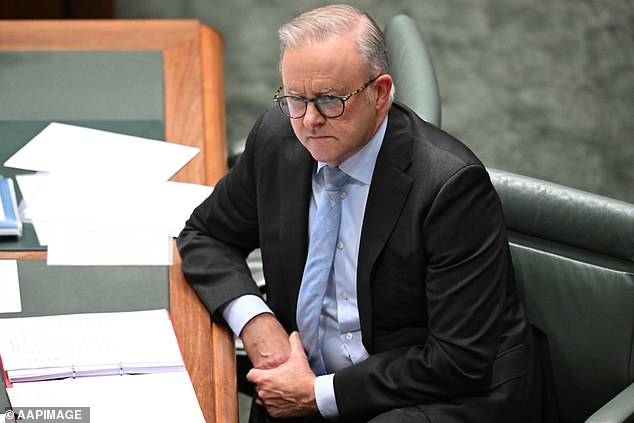Why Anthony Albanese should be worried about his future as PM – as the Coalition pulls off a huge feat in new poll
Support for the coalition has risen to its highest point in almost three years as Peter Dutton closes in on Anthony Albanese as the preferred leader, a new poll shows.
The Prime Minister’s party has come under fire in recent weeks over its handling of the immigration detainee scandal and any hopes of a boost to its electoral fortunes after the Budget appear to have evaporated.
The latest Newspoll, conducted by The AustralianFigures show the Coalition’s primary vote rose by two points to 39 percent, while support for Labor fell to 33 percent.
With less than a year until the next election, this represents the strongest coalition primary since August 2021, when Scott Morrison was prime minister.
Most worrying for Mr Albanese personally is the opposition leader’s increasing popularity among voters.
The latest Newspoll, conducted by The Australian, shows the Coalition primary vote rose by two points to 39 percent, while support for Labor fell to 33 percent.
The Prime Minister’s lead over Dutton has been cut from 19 points three weeks ago to just eight in the latest poll.
Those who believed Mr Albanese would make a better prime minister fell six points to 46 percent, while support for Mr Dutton rose five points to 38 percent.
This marks the smallest lead Albanese has had over his rival since the elections.
It means the two leaders are now almost neck-and-neck when it comes to net overall approval ratings.
The survey, which surveyed 1,232 voters across Australia between June 3 and 7, also found support for the Greens fell by two points to 11 per cent – the lowest level since September 2022.
It signals that the likelihood of a hung parliament at the next election has increased, with Labor likely to be forced into a minority government along with the Greens or independents.
Mr Albanese and Mr Dutton have recently clashed over the direction of Australai’s energy policy.
The Opposition Leader said he would abandon Australia’s 2030 target of cutting emissions by 43 percent from 2005 levels if the Coalition wins the next federal election.
Instead, Mr Dutton has supported the use of nuclear energy in the fight to reach net zero by 2050.
Under the Paris Agreement, member states must increase their emissions targets every five years and must not lower them.
It obliges countries to take measures that limit global temperature rise to 1.5 degrees Celsius and keep it below 2 degrees Celsius.
Mr Albanese said Mr Dutton “never took climate change seriously”.

Perhaps most worrying for Prime Minister Anthony Albanese personally is the opposition leader’s increasing popularity among voters.
“He still won’t tell the Australian people where he plans to locate his nuclear reactors – or how much they will cost,” Albanese wrote on X.
Climate groups warn that rolling back Australia’s targets could hamper investment as the country transitions to a cleaner economy.
Such a move could jeopardize Australia’s membership of the Paris Agreement on climate change.
Energy Minister Chris Bowen described the coalition’s explanation of its policy as a “rolling disaster.”
“The fact is that the Paris agreement is crystal clear, there can be no backsliding,” he said.
‘If you reduce your target, you violate the Paris agreement.’
